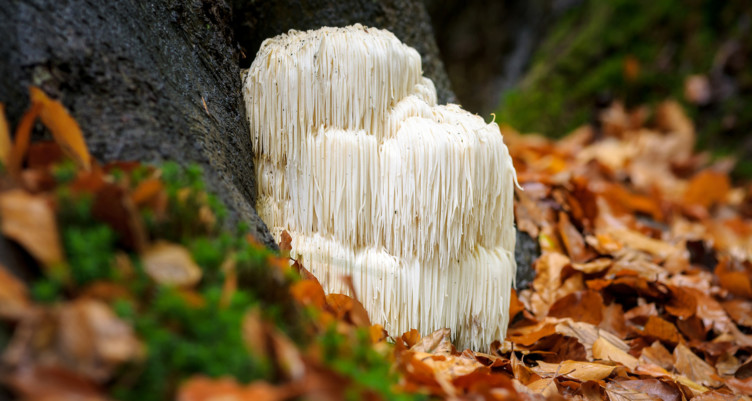If you squint, lion’s mane mushroom looks a lot like its namesake—but it also looks like a funky cotton ball, a mophead or a tiny Komondor dog. Nature, right? It’s weird. Lion’s mane mushroom is also a powerful nootropic (aka smart drug) that has tons of science-backed benefits.
You might have heard of people mixing lion’s mane into their coffee or supplementing with lion’s mane mushroom capsules. What gives? Is it really good for you, or is everyone tripping on Mufasa?
As it turns out, if you want to remember better, age slower and supercharge your brain cells, lion’s mane may be worth your time. Here’s what you should know, including a few tips to take those neuroprotective benefits to the next level.
Lion’s mane mushroom benefits
With roots in traditional Chinese medicine (TCM), lion’s mane mushroom is also known as Hericium erinaceus, yamabushitake, hedgehog mushroom and houtou. Based on human and animal studies, this humble shroom has powerful anti-inflammatory, antioxidant and immunostimulant properties. Translation: It’s pretty amazing.
Supports brain health

Your brain naturally slows down over time. The symptoms you associate with aging—like memory loss and lack of focus—are caused by factors in your nervous system like shrinking neurons and damaged brain cells. Animal studies show that lion’s mane mushroom extract may actually support brain health by stimulating the creation of two important compounds: nerve growth factor (NGF) and brain-derived neurotrophic factor (BDNF).[1][2]
NGF and BDNF are proteins that stimulate the production of new cells and strengthen existing ones. NGF also plays an important role in forming myelin, the sheath around nerve cells that helps brain cells do their job. BDNF increases brain plasticity, which helps your brain cells stay resilient in the face of stress or aging.
May improve cognitive function

In 2008, a double-blind, parallel-group, placebo-controlled trial found that lion’s mane effectively improved cognitive function in a randomized group of 15 older adults.[3] Rodent studies found that lion’s mane potentially may have protective effects on brain cells, improve memory and promote the creation of new neurons.[4][5][6]
In an interview with Bulletproof founder Dave Asprey on an episode of the Bulletproof Radio podcast episode, tonic herbalists and superfood specialists Joy Coelho and Jay Denman say lion’s mane “helps to get rid of amyloid plaque as well as build myelin sheaths.” Amyloid plaque is a protein that destroys healthy neurons, impairs cognition and has been associated with neurodegenerative conditions.[7]
How does it work? Researchers are figuring that out right now, so they can’t say anything definitive—yet.
In a 2009 review, researchers found that hericenones and erinacines from the fruiting body and mycelium of lion’s mane easily cross the blood-brain barrier to stimulates NGF.[8]
Lion’s mane has also powerful antioxidant activity and anti-inflammatory properties.[9] Antioxidants neutralize free radicals, preventing them from causing inflammation or damaging your cells. Antioxidants help you make more BDNF, and lion’s mane stimulates BDNF and NGF.
That’s a one-two punch of neural health, which may slow or reverse cell degradation—a big deal for your brain right now, and an even bigger deal for future you.
May improve mood and focus

In 2010, researchers examined the effects of lion’s mane mushroom on 30 women over a four-week period.[10] The participants were randomly assigned to a test group or a control group, and they were given lion’s mane mushroom cookies or placebo cookies (science!). At the end of the four weeks, the lion’s mane mushroom group reported an improvement in mood.
This was a small study, and clinical research on lion’s mane is limited. However, these findings complement a growing body of research that suggests natural treatments can help you feel more balanced.
Lion’s mane may boost focus, too. Reduced inflammation improves blood flow, which provides your brain with more oxygen. The side effect of more oxygen in your brain is better brain performance. The antioxidants in lion’s mane may help promote learning and memory, possibly by strengthening your brain cells and stimulating the growth of new neurons.
Souce: https://www.bulletproof.com/supplements/dietary-supplements/lions-mane-mushroom-benefits/
 English
English
 Français
Français

Can you be more specific about the content of your article? After reading it, I still have some doubts. Hope you can help me.
Can you be more specific about the content of your article? After reading it, I still have some doubts. Hope you can help me.